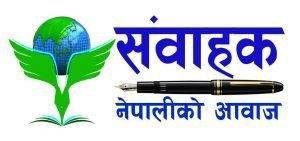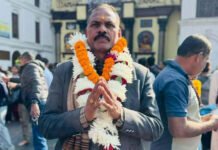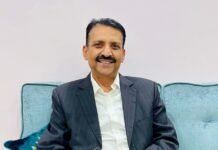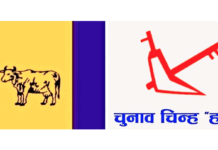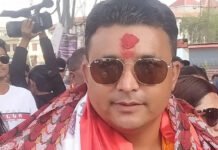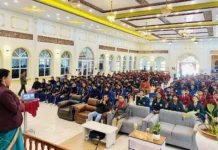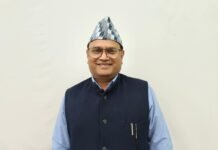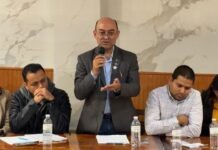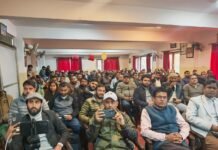Atishi Marlena, the former education advisor to Delhi’s deputy CM Manish Sisodia might be a contender for the Lok Sabha seat for East Delhi constituency, but at her heart is education. The brain behind changing the face of the public education system, Atishi was recently in Goa to inaugurate the AAP Office in South Goa. She also spoke at symposium on the topic ‘Future of India through education’. NT BUZZ caught up with her to discuss education
Danuska Da Gama I NT BUZZ
‘Never doubt that a group of thoughtful, committed citizens can change the world. Indeed, it’s the only thing that ever has.’
This quote by Margaret Mead is what defines the life of Atishi – politician, educationist and reformer.
Having studied history at St Stephen’s College and attained her Masters at Oxford University Atishi could have had a superior professional calling. However, with an aim to reform education and serve society she returned to teach at Rishi Valley School in Andhra Pradesh and in a village in Bhopal, Madhya Pradesh.
She rose to become the advisor to the education minister and was on the Delhi government’s pay roll, earning Re 1. While her stint ended just before completing three years. The efforts and will utilised speaks volumes in the fact that the education system in the national capital has be revitalised.
Under her guidance several projects like the Mission Buniyad aim to improve learning levels of primary and secondary students and the Teacher Development Coordinator Programme designed to create a platform for peer learning among teachers, dealing with the grievances and inputs from School Management Committees and for restructuring the directorate of education were incorporated. The Happiness Curriculum designed to increase the ‘happiness equality’ levels of students was also put into force, besides being involved in strengthening regulations on private school fees and organising parent-teacher meetings.
Excerpts from an interview
- Are you an ‘activist for education’? Why should this cause be a priority?
I believe that an investment in education is in fact an investment in the future of our country. It is the ladder that will bridge the inequality in the society. If one looks around the world, all developed nations have been formed on the foundation of a stellar public education system. India cannot move ahead without improving its government schools. High quality education should be the right of every child- irrespective of their ability to pay for it. With the Right to Education Act, education has become every child’s right; it is now time to ensure that the quality of education our children receive is not decided by how rich or poor their families are.
- When did you realise you have a special calling to do something in education?
I had realised early in life that education is the key to transforming the future of this country. I, in fact have a degree in Education as well. It is a fact that good public education can elevate a family out of the cycle of poverty. But more than that, education actually plays an instrumental role in shaping well rounded, kind and socially conscious individuals. I believe education is the most effective means to improve the world we live in.
- The model followed in Delhi for education has been garnering acclaim. It isn’t easy to execute such plans. Can you highlight the changes, and the manner in which it is implemented successfully?
I think one of our most important interventions to ensure implementation was to involve parents and community members in the process. Under the RTE (Right to Education), each government school is required to have an elected parent member body called the School Management Committee (SMC). In Delhi’s government schools we strengthened these SMCs because we believed that parents would be the most concerned stakeholders in the education system. Our SMC members have brought accountability to the entire system and have ensured that every policy is implemented up to the last level. Even an illiterate and poor parent wants his or her child to have high quality education. Bringing them into the education revolution has been one of our most impactful interventions.
- The Delhi government has invested a lot on teacher training. How can this help change the system?
As the government we can invest money to improve the infrastructure and facilities in schools but teachers are the real agents of change inside a classroom. We have sent teachers of Delhi government schools for trainings to Harvard University, IIM Ahmedabad, NIE Singapore, Cambridge University and many other places around the world. The plan was to bring world class education to Delhi’s children and for that we have given to our teacher’s access to the best resources available. But most importantly teachers were finally given the dignity they deserved and that has made the difference in classrooms!
- Unlike other states the budget allocation for education by Delhi Government is very high. Are you happy or ‘ye dil mange’ more?
In Delhi our budget allocation is more than one-fourth of the total budget of the state. It’s the highest of any state in India. While there is no limit to the amount of money one can use in our schools, beyond a point the focus needs to shift to other aspects of improving education. Instead of pumping money and hoping that money alone will be enough, we have improved implementation at the ground level. Our work in Delhi’s government schools has included regular teacher training, involving parents and community members to improve accountability of the system and bridge the learning gap in our students.
- Being concerned about changing the education system is one aspect. Does it really need to have political will to bring about that change?
Absolutely. The most important aspect of any change in government systems lies in political will. I always say that policy work is not rocket science. The only reason we could transform Delhi’s schools was because we believed that it is every child’s right to have access to world class education. Any other government that decides to improve its education system could accomplish the same results as Delhi. It is simply a matter of political will to allocate funds but more importantly to ensure implementation at each level.
- Happiness curriculum has had no parallel. Manish Sisodia touched upon it during his visit here. What has the experience been so far?
Happiness Curriculum is an experiment based on our belief that the purpose of education is to produce children who are compassionate, well-rounded individuals. It has had a very positive response from both children and teachers. In today’s stressful world, Happiness Curriculum should be introduced to all schools, not just our government schools. Children should have the opportunity to understand humanist values that make life fulfilling.
- From here what’s next?
A strong public education system is a necessity for this country. Yet, elections in our country are fought and won on religion and caste. It is time to change that and make education an issue. Partisan politics is a ploy that many political parties make to shift the focus from our broken governance systems. I plan on bringing the focus back to issues that actually matter to the common man and woman.
